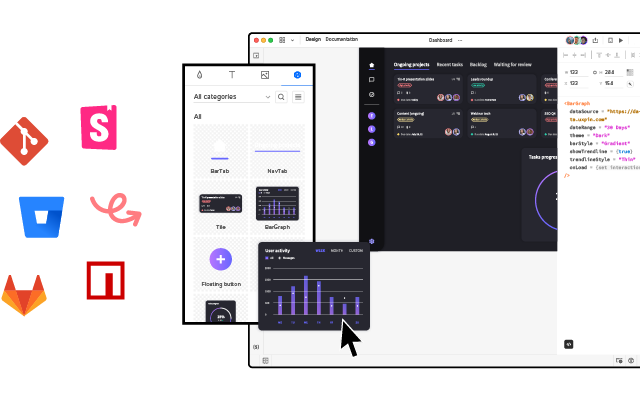What Is ResearchOps and Why Is This Role So Useful

ResearchOps is an emerging practice in the UX space. Companies have realized the importance of effective user research to create products that best serve the customer.
Traditionally, user research was part of a UX designer’s role, but companies are now dedicating entire teams to manage user research, including the people, tools, processes, and operations.
ResearchOps manages these elements to optimize and streamline an organization’s user research.
UXPin is a design tool ResearchOps can use for effective collaboration between UX designers, researchers, and developers. With UXPin, researchers can use high-fidelity prototypes with actual data for usability studies.
What is ResearchOps?
In early 2018, user researchers worldwide came together to discuss and shape ResearchOps, and define its place within the organizational structure.
A team of 60 organizers ran 34 workshops worldwide in a project aptly named #WhatisResearchOps. Together these “ResearchOps-ers” arrived at the following definition:
“ResearchOps is the people, mechanisms, and strategies that set user research in motion. It provides the roles, tools, and processes needed to support researchers in delivering and scaling the impact of the craft across an organization.”
Why ResearchOps Matters
As UX and user research teams grow, so too do the people, tasks, costs, communications, processes, and tools necessary to maintain them. ResearchOps absorbs these time-consuming components so UX teams can focus on design and research.
ResearchOps also connects user research teams with the rest of the organization to communicate with stakeholders.
Essentially, ResearchOps takes care of the bureaucratic processes that often slow down UX deadlines, thus making teams more efficient.
ResearchOps Responsibilities
The #WhatisResearchOps project came up with a fantastic mind map outlining the ResearchOps’ roles and responsibilities. We can summarize this mind map as follows:
Recruiting
Recruiting participants is one of ResearchOps’ primary responsibilities. ResearchOps must recruit, screen, schedule, and compensate research participants.
This important administrative task frees user research teams to focus on conducting research and compiling the necessary reports.
Governance
To comply with increasing data privacy regulations and maintain a high standard of ethics, ResearchOps must continually update an organization’s research privacy policies while managing user data responsibly.
ResearchOps plays a crucial role in minimizing access to personally identifiable information (PII) within an organization.
ResearchOps governance tasks include:
- Understanding data privacy regulations and applying relevant standard operating procedures to user research, communications, and data storage
- Establishing ethical standards for user research and communication
- Formulating consent forms in line with data privacy regulations
- Managing PII study materials’ storage, sharing, and disposal—interview scripts, audio, and video recordings
Knowledge Management
Companies that conduct a lot of research build extensive libraries of data. ResearchOps must collect and organize this data to make it easy for teams to find and reference through research repositories.
These research repositories also prevent teams from repeating studies, saving precious time and resources.
Tools
User research and ResearchOps rely on many tools, including equipment, software, and hardware. These tools require admin processes such as procurement, licensing, permissions, onboarding, and planning.
Here is a breakdown of how ResearchOps manages tools:
- Applications to handle and store PII
- Ensuring that research tools conform to data privacy regulations
- Research tools for usability studies, surveys, and interviews (AV equipment, etc.)
- Managing access and permissions
- Facilitating the onboarding and training for tools and processes.
- Maintaining subscriptions and licenses for tools
Research Spaces
Research spaces are vital for conducting effective, accurate user research. ResearchOps must find and manage both virtual and physical spaces for teams to conduct research.
This important logistical role gives research teams adequate space to conduct research while providing participants with a comfortable environment for accurate feedback.
Training & Mentoring
ResearchOps plays a vital role in training researchers and non-researchers with the latest and best research practices. This training also extends to ethics and compliance, so teams never stray onto the wrong side of regulation.
ResearchOps must also provide mentoring for new researchers to streamline onboarding.
As well as physical training, ResearchOps must create the standard operating procedures for research methods and which studies to apply.
Some training and mentoring responsibilities include:
- Arranging outside speakers and training
- Hosting team training events
- Team building exercises
- Social events
- Peer review sessions
- Brainstorming sessions to improve user research
Internal Communications
ResearchOps is responsible for all internal UX research communications, including providing reports and updates to the rest of the organization. This feedback helps the company recognize the importance of user research, which can help secure funding and resources.
ResearchOps’ internal communication might include:
- Creating a UX research-team purpose to align with the organization’s mission statement
- Communicating research wins
- Generating case studies to showcase how user research contributed to solving product issues or increasing revenue/user signups
- Sharing regular progress reports and research insights
Budgeting
Budget management is another essential ResearchOps responsibility. This fiscal responsibility ensures teams have the resources to conduct quality studies.
ResearchOps must also prioritize spending to align with the rest of the organization’s projects and goals.
ResearchOps budgeting includes:
- Tracking operational spending
- Syncing with inter-departmental budgeting
- Facilitating budget approvals
- Allocating budgets at the project and user research level
The Value of ResearchOps
The most significant benefit of ResearchOps for an organization is efficiency. With the support of ResearchOps, UX teams can focus on the tasks that directly enhance the user experience.
This efficiency helps organizations achieve their goals faster while maintaining high research standards and staying compliant.
For small teams, a dedicated ResearchOps team or individual might not be feasible, but as a startup scales, the necessity for this department increases.
How ResearchOps & DesignOps Work Together
As ResearchOps and DesignOps have evolved from UX, it’s only natural that these entities align to optimize teams and workflows. For many companies, ResearchOps is not its own department but rather a DesignOps division.
The DesignOps role has been around for some time, while ResearchOps is still in its infancy. As the discipline evolves, we’ll likely see more companies, including DesignOps and ResearchOps roles.
When you look at each department’s core purpose and responsibilities, you notice a clear division between the two, but there are areas of overlap.
ResearchOps & DesignOps Overlap
The biggest overlap between DesignOps and ResearchOps is shared goals and values. While their processes and responsibilities don’t always overlap, they must align towards a common goal.
These teams must also work together to compile comprehensive, big-picture insights and reports for the rest of the organization.
ResearchOps Tools
Another area where ResearchOps overlaps with DesignOps is through shared tools. UXPin Merge, for example, helps cross-functional collaboration where research teams can use fully functional high-fidelity prototypes built with ready React or Storybook components for testing.
ResearchOps tools fall into several categories, including:
- Managing assets and insights—research repositories
- Data analysis, analytics, & tracking
- Project management
- Team collaboration and communication
- Wireframing, prototyping & mockups
- Storytelling and reporting
- Scheduling
- Accessibility testing
- Survey, polling, & research tools
- Virtual research spaces
- Design collaboration
- Transcribing and note-taking
- User journey mapping
- Information architecture
- Budget management
Outside of these tools, ResearchOps might also need AV and recording equipment for lab studies.
How to Get Started with ResearchOps
Getting started with ResearchOps begins with identifying your researcher’s biggest pain points. What tasks and processes slow research progress? These tasks and processes will likely be administrative for most companies, the core function of a ResearchOps role.
Other questions you might want to consider include:
- Does your organization need a better way to manage and access research data?
- Do you ever have trouble recruiting the right study participants?
- Have you ever found yourself accidentally repeating user studies?
- Does your user research ever go over budget?
- Are research insights and reports comprehensive enough, and do teams deliver these on time?
- Are your organization’s research practices compliant?
- Do your usability studies operate smoothly?
A good place to start is surveying your research teams to find out where their pain points lie. You can also connect with other departments and stakeholders to find out if they experience any problems with user research.
By answering these questions and assigning a cost to your user research teams’ issues, you can measure the feasibility of a ResearchOps position.
The Individual’s Path to ResearchOps
Although ResearchOps manages user research, it’s actually a project management discipline. While it’s helpful to understand the UX process, it’s more beneficial to have a project management background for a ResearchOps position.
TL;DR
ResearchOps is an emerging role born from UX with a growing international community.
ResearchOps aims to provide support to researchers by managing and optimizing the time-consuming administrative processes that slow progress.
UXPin for ResearchOps
UXPin is a collaborative design tool that enables teams to scale products and features faster.
With UXPin Merge, ResearchOps can equip researchers with high-fidelity prototypes with React or Storybook components and actual data. These interactive prototypes provide users with an authentic user experience, thus producing valuable, accurate study data.
Discover Merge and start designing better products with UXPin.


